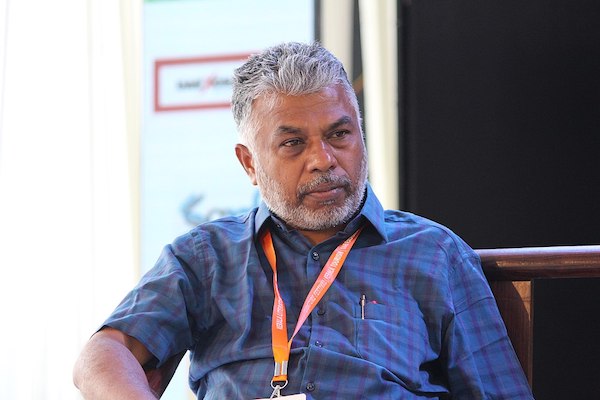Book Review: “Pyre” — A Powerful Romeo & Juliet Fable That Centers on Caste
By David Mehegan
The Tamil version of Pyre, under the title, Pukkuli, was dedicated to a young man murdered in his community for making an inter-caste marriage.
Pyre by Perumal Murugan. Translated, from the Tamil, by Aniruddhan Vasudevan. Grove Atlantic/Black Cat Books. 202 pp. Paper. $17.
 For most of us, the greatest risk in the writing of fiction is that of our labors scorned or ignored, or, even if we are published, the tragic fate of the remainder table. It is good to be reminded now and then what a price in personal risk many artists face in the pursuit of their work, and what courage it takes to persist.
For most of us, the greatest risk in the writing of fiction is that of our labors scorned or ignored, or, even if we are published, the tragic fate of the remainder table. It is good to be reminded now and then what a price in personal risk many artists face in the pursuit of their work, and what courage it takes to persist.
Born in Namakkal District, in the southern state of Tamil Nadu, Perumal Murugan is an Indian professor of literature and the author of 11 novels and several collections of poems and short stories. He writes in Tamil, one of India’s 22 officially recognized languages. Unlike many urbanized, Anglophone Indian writers known in the West, Murugan is a product of village India (his parents were farmers) and his works are set in that world. His two best-known are the novels One Part Woman (2010) and The Story of a Goat (2017).
One Part Woman, set in a small village, concerns a childless couple. Longing for a child, the woman participates in a local religious festival in which, for one night, unrestricted sex is allowed to anyone. The book won acclaim in literary circles, but it generated outrage among some conservative followers of the BJP party, the Hindu-nationalist party of Prime Minister Narendra Modi, who denied that such a practice exists and saw the book as an attack on rural Hindu morality. An explosion of threats and attacks followed and Murugan was driven from his teaching job in Namakkal. Protests were eventually calmed when in 2014 Murugan was forced to sign an apology for the book and agree to the withdrawal of all copies. A lawsuit against him was eventually thrown out by the Madras High Court.
Exasperated by the harassment, in 2015 Murugan announced that he was giving up writing: “Perumal Murugan the writer is dead,” he wrote on his Facebook page. “As he is no God, he is not going to resurrect himself. He also has no faith in rebirth. An ordinary teacher, he will live as P. Murugan. Leave him alone.”
The self-exile did not last, however, and more works emerged, most famously The Story of a Goat. It and One Part Woman were long-listed in the United States for the National Book Award in Translation. Murugan acknowledged in interviews that he could not deny himself — he had to be a writer.
Pyre, which appeared in 2013, apparently did not excite public controversy, although one could imagine that it would, given its subject and plot: the cruelties of the caste system. It is a Romeo & Juliet fable, centered not on family rivalry but on caste. Young Kumaresan, raised in the village of Kattuppatti, had been sent for work at a soda bottling business in the larger town of Tholur, where he meets and falls in love with Saroja. She agrees to elope with him and travel back with him to Kattuppatti, where he hopes to set up his own soda business.
Like most young lovers who believe that amor omnia vincit, Kumaresan and Saroja have a rude awakening. All that anyone in Kattuppatti cares to know about Saroja is, what is her caste? Kumaresan assures them that she is of their caste, but her light complexion and town manner tell them otherwise, and the result is a hysterical rejection by his widowed mother, Marayi, and the relentless hostility of everyone else in the town. “Why did you do this?” Marayi screams at Kumaresan the moment he arrives with his new wife. The news had preceded him home. “She clutched his shirt in her fist and slapped him repeatedly…. And then turning to Saroja, she screamed, ‘What did you do to bewitch my son? How many men have you done this to?’”
OK, we see where this is going, and Saroja sees it too. Strangely, though, Kumaresan does not see it, and persists in thinking that opposition can be overcome by his love for Saroja and by his determination that family and neighborhood must accept his choice. He takes his bride to visit a beloved uncle in a nearby village, thinking that surely filial ties will overrule the primitive obsession with caste. Surprise — it does not.
“His appucchi [uncle] was a tall, well-built man. He rushed toward Kumaresan and slapped him hard, shouting, ‘Why have you come here, you shameless dog?’
“Wincing under that stinging slap, Kumaresan staggered back, but his appuchchi dragged him forward and hit him several times.
“’You ungrateful dog!’ his appucchi screamed, ‘I raised you. I fed you.’
“Kumaresan had not expected such a welcome.”
He did not, but the reader did. This pattern continues throughout and the situation culminates in the book’s terrible but ambiguous conclusion. Saroja is in a spiral of fear from the moment she gets to Kattuppatti. She finds herself the object of unlimited hatred by people who do not know her, and she begs Kumaresan to take her away, back to Tholur, or at least to some town where they could be accepted. But no, he can’t give up his conviction that his people will relent sooner or later, even though his mother had explicitly warned him, during a recent visit, “Please don’t come back here dragging along a girl from a different caste.”
What we have here, it seems to me, is a plot plan that requires a character to do what makes no sense. Kumaresan’s refusal to face facts has tragic consequences which we see coming, and it is difficult to believe that anyone could be so dense to the evidence of his senses and experience, given that he was raised in this world and surely knew how caste dominates community thinking and values. But it must be so if the author is to tell the doleful tale of the inhumanity of folkways that have no respect for individuality or personal love. The Tamil version of Pyre, under the title, Pukkuli, was dedicated to a young man murdered in his community for making an inter-caste marriage.
Many of us have been exposed recently to the idea of caste from Isabel Wilkerson’s 2020 book, Caste: The Origins of Our Discontents, which analyzes what W.E.B. Du Bois called “the problem of the color-line” in America in terms of this ancient systemic practice. According to this rigid mentality, humanity has to be organized in strata, and the most important thing is for those in higher strata to stay there, and to keep the lower orders where they are. This is a simplification of Wilkerson’s thesis, but her approach is in accord with what we have seen and known over the history of white supremacy.

Author Perumal Murugan will not be silenced. Photo: Wiki Common
But in Pyre, caste is never explained or openly defended or deplored, and is not understood in relation to what we are accustomed to call “race.” Castes are never named. They have more the inevitability of the weather. Kumaresan is often asked, “What is her caste?,” but he only answers, “The same as ours,” which enrages the questioner. This seems to be what matters: not skin color, nor region or religion, or even that her caste, whatever it is, might be lower than that of people in Kattuppatti. Difference itself is feared and hated and warred against. More than what we think of as racism, it is the realm of tribalism: Not that “she is lower than us,” but more simply, “she is not one of us.”
Murugan’s style is as simple and plain as the impoverished setting of Kattuppatti, as undecorated as Marayi’s goats, the food, and the huts people live in. It is almost the style of what we would call a young adult novel, and indeed the young in any language could understand and learn from it.
The fear and hatred of difference is even deeper than racism and underlies it, in my own view, and it undercuts civilized society wherever it reigns unchallenged. The defiance and rejection of it in his literary art has at least once gotten Perumal Murugan in hot water, but it seems that he cannot be silenced.
David Mehegan is the former book editor and book beat writer of the Boston Globe. He can be reached at djmehegan@comcast.net.
Tagged: David Mehegan, Grove Atlantic/Black Cat Books, Perumal Murugan, Pyre
